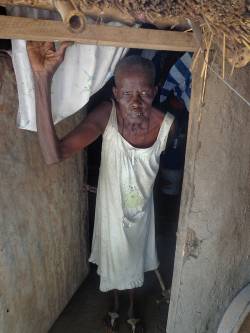 As the plane from Nairobi landed at Juba International Airport in South Sudan many thoughts ran through my mind. The horrifying images that had saturated the media flickered before my eyes as the plane landed. I didn’t know what to expect and was worried about the security situation.
As the plane from Nairobi landed at Juba International Airport in South Sudan many thoughts ran through my mind. The horrifying images that had saturated the media flickered before my eyes as the plane landed. I didn’t know what to expect and was worried about the security situation.
The airport was a bit chaotic but everything seemed normal. On hand to receive us was a representative from our affiliate, the South Sudan Older People’s Organization (SSOPO). SSOPO support older people by building older people’s knowledge in areas such as human rights and health services.
The ten-minute drive from the airport revealed a different picture from the images I had seen since conflict erupted in December 2013. Over one million people have been displaced and thousands killed. The town appeared busy and vibrant despite the heavy security presence. We could have been in any other African city.
Older people struggling with poor services and trauma
We went straight to UN House, one of the two major camps in Juba, housing internally displaced people (IDPs). It currently has a population of around 12,000. The camp shelters were made of 4 by 4 metre tarpaulins, shared by up to seven people.
We met a group of twenty older men and women. They explained that one of the biggest challenges was accessing services. The latrines were too far and there were no rails inside to support them. They also spoke about having nothing to occupy them, which made them think bitterly about what they had gone through. It was clear that they needed psychosocial support.
“We are not able to go outside the camp because we may be raped”, said one woman. Although security in the UN camp is good, outside is not safe, especially for women. “I lost my husband. He was killed,” another woman told us.
Little information on healthcare
Access to health services was another challenge facing older people. There was not much information about where to access services and whatever was available was displayed on posters that many older people could not read because they were illiterate.
This group also faced protection challenges. Most of them had distinct marks on their faces that easily identified their ethnicity. This was risky for them as the conflict in South Sudan has an ethnic dimension.
Currently around 4% of South Sudan’s population are older but it’s not yet known how many older people there are in these camps as statistics on age have not been collected. Assessments on vulnerability were ongoing but experience shows that older people often make up a high proportion of the most vulnerable.
At one of the meetings, older and disabled people said they felt their needs were not being catered for, in terms of accessing many of the services they needed.
What HelpAge is doing
As I flew back to Nairobi, I thought about this group’s plight. Their voices remain silent and unheard. Although many organisations are supporting displaced people, no-one is focusing on older people who make up the backbone of South Sudanese society and have lived through decades of war; only to be displaced again.
HelpAge International are now working in Juba to cater for the welfare of older men, women and their families. Our work will include providing older people with essential items such as mats, blankets, as well as visual, mobility and auditory aids.
We’ll be ensuring better access to age-friendly services such as special latrines, eye care and psychosocial support and we plan to train other humanitarian agencies so they understand the issues relating to older people in emergencies.
Find out more about the humanitarian crisis in South Sudan.
